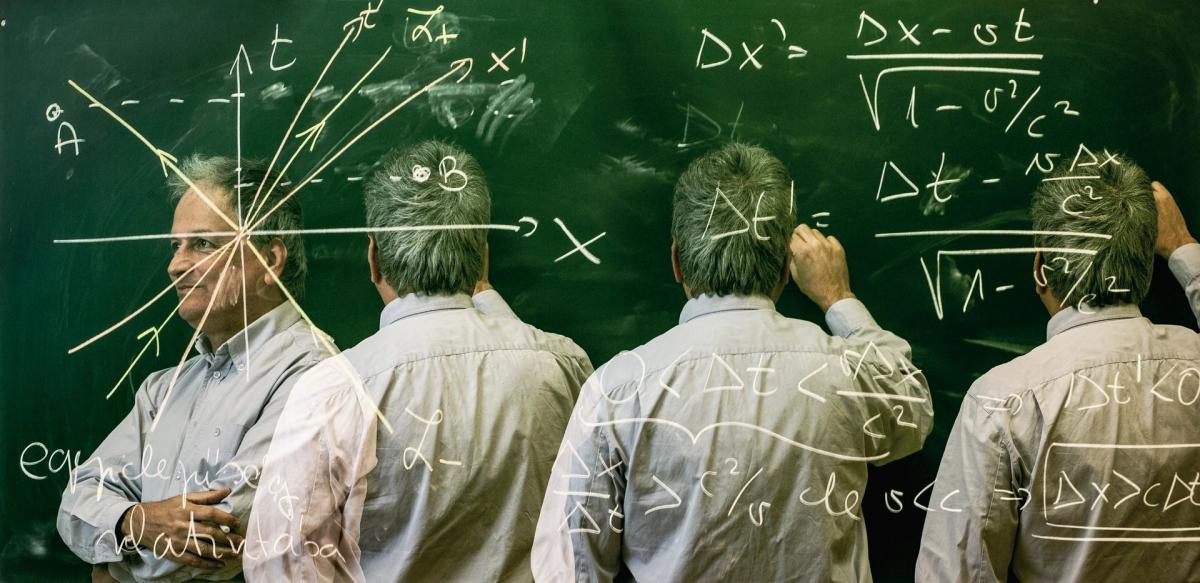2024. April 02.
A professor of physics of the BME is the star of this year's winning portrait in Hungary's largest press photo contest.
The photo that won the silver medal of the 42nd Hungarian Press Photo Contest in the category "Portrait (singles)" in 2024 was taken while he was teaching relativity at the BME The central character of the photo is Gábor Takács, professor of Department of Theoretical Physics, Institute of Physics at the BME’s Faculty of Natural Sciences (BME TTK) and head of the Doctoral School of Physics. The artwork made of him was published in “Magyar Kultúra Magazin” (a Hungarian cultural magazine) No. 1 of 2024, in an interview that explores the concept of time from different perspectives. The professor of theoretical physics at the BME was one of the interviewees, along with other experts in his field. The prized photo of the article was taken by András Éberling, a photo editor and photojournalist of “Magyar Nemzet” (a significant daily newspaper in Hungary). (Several entries of the photographer have won awards: his photo titled “János Sándor retired theatre director” was awarded the first prize in the category“Portrait (singles)”.) In the interview on that, András Éberling reveales that he tried to create a portrait in which he could condense into a single image all that journalists can reproduce only in long interviews and reports. Fortunately, the interviewees were open to the ideas and the forms of capture preferred by the photographer.

András Éberling: “Gábor Takács and the concept of time in the theory of relativity”, 42nd Hungarian Press Photo Contest, category “Portrait (singles)”, 2. place
(The list of winners of the 42nd Hungarian Press Photo Contest and their works are available on the contest website.)
The photograph was taken in the seminar room of the Department of Theoretical Physics of the BME’s Faculty of Natural Sciences. When the photo was taken, Gábor Takács was explaining that in special relativity, the simultaneity of events depends on the observer, and under certain conditions, it is also a function of the frame of reference which of two events occurred first. The prize-winning photo also shows a space-time diagram and a derivation of the relativity of the time sequence based on the Lorentz transformation.

In the interview mentioned above, theory of relativity was referred in relation to the concept of time but Professor Gábor Takács also discussed the role of thermodynamics, quantum theory and gravity in relation to time. ‘The concept of time is always relevant. From times immemorial, humankind has been intrigued by it and it plays a significant role in our daily life as well. Time is one of the basic concepts in physics, therefore, issues related to time, the nature of time, the irreversibility of thermodynamic processes are all actively researched areas of modern physics. Measuring time as accurately as possible is particularly important in practice. For instance, for satellite navigation systems, that wouldn't work without the concept of time in theory of relativity,’ says Gábor Takács who gave interviews in other forums as well: in the TV programme ‘Multiverzum’ on Channel M4 he had a conversation about that issues and also gave a lecture on time as part of the BME TTK Science Campus programme. (About the latter, bme.hu has already published an interview with Gábor Takács - ed.)

The professor of physics stressed that relativity is a basic field in theoretical physics education, and includes interesting topics such as relativistic paradoxes (e.g. time passes more slowly in a fast-moving spaceship, metresticks become shorter, twins age at different rates, etc. - ed.). He also stressed that thermodynamics has regained a major boost at the forefront of physics research, mainly in relation to the ongoing quantum technological revolution. Advances in technology have made it possible to directly control quantum systems as well as a deeper understanding of issues related to the direction of processes. In that latter field, Gábor Takács conducts research as well and he finds that the topic is also popular among physics students. ‘Time is essential also in cosmology, which I was always interested in, as the origins of our world raise ultimate questions. Despite the fact that there are still many unanswered questions, huge progress is being made in this area.’
The professor of the BME stressed that in-person education is particularly important in areas requiring in-depth knowledge such as theoretical physics. ‘Reading great books on a subject is not enough. Videos may help to bring a topic to a wider audience; however, there is a lack of interactivity and lively, often heated discussions. However, in-person education provides a guide, supports to navigate between or focus on sub-topics, and students can ask questions and discuss their dilemmas with their instructors. Science is the collective creation of mankind and questions and answers, scientific discussion are an essential part of it. Instructors actively participating in modern research can provide insights that no written sientific literature can. In a seminar or an in-person course, the instructor conveys a world view, too, provides his students with the latest information on physics research methods and the relevance of the results, and helps his students integrate new information into their existing knowledge,’ highlighted Gábor Takács the importance of mentor-students relations.
TZS-KJ
Photo sources: Éberling András/Magyar Kultúra, pixabay.com


